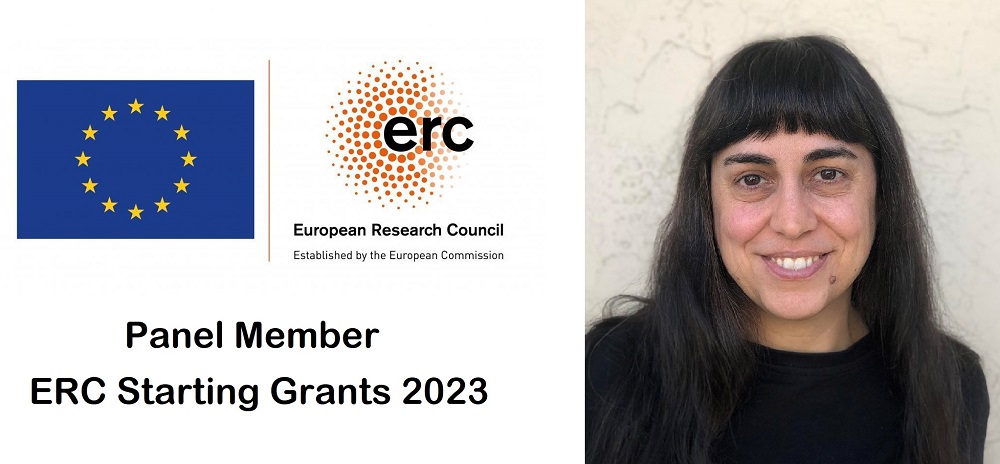Beatriz Rodríguez-Labajos, member of the evaluation panel of the last call for ERC Starting Grants
Beatriz Rodríguez-Labajos, member of the evaluation panel of the last call for ERC Starting Grants
The Beatriu de Pinós researcher, linked to the JHU-UPF Public Policy Center research group of the UPF Department of Political and Social Sciences, was selected to participate in the evaluation process of the 2023 call for these prestigious grants, awarded by the European Research Council.

Beatriz Rodríguez-Labajos, a Beatriu de Pinós researcher at the JHU-UPF Public Policy Center of the Department of Political and Social Sciences at Pompeu Fabra University, took part in the evaluation panel in the European Commission’s 2023 call for European Research Council (ERC) Starting Grants.
In this process, she joined a selected group of world experts in the social sciences and humanities under the theme “Human Mobility, Environment and Space” (Panel SH7). Her participation is an indicator of the external perception of the quality of the research carried out at UPF. The panel make-up was kept confidential until the ERC recently published the list of its members.
A thorough evaluation process, including two phases
The European Research Council panels are groups of top scientists from around the world, organized into 27 themes grouped into three areas of science: life sciences, physical sciences and engineering, and social sciences and humanities.
Panel members meet online and face-to-face, in Brussels, to support the ERC in selecting the best project proposals. The process is very thorough and consists of two stages. In the first, participants examine a large number of proposals based on an extensive summary of the project and a series of documents that help assess the applicant’s excellence.
The panel in which Beatriz Rodríguez-Labajos has participated, SH7, gathers experts on topics such as human mobility, sustainability, human geography, demography, social aspects of health, and spatial planning
Only the few proposals that go on to the second stage of evaluation are read in full, both by the members of the panel and by expert reviewers who specialize in the subject matter. As part of this second stage, the panellists also interview applicants (online) concerning the details of the proposals requiring clarification.
Throughout the process, extreme care is taken to ensure that conflicts of interest do not affect the review and that all applicants have an equal chance of success. “Although I was aware of these provisions before becoming a member of the panel, the effort made to comply with them gave me even more respect for the ERC's vision”, Beatriz Rodríguez-Labajos asserts.
A newly created panel on human relations with space and the environment
Specifically, the panel in which Beatriz Rodríguez-Labajos has participated, SH7, gathers experts on topics such as human mobility, sustainability, human geography, demography, social aspects of health, and spatial planning. Together, it addresses human relations with space and the environment
The Beatriu de Pinós researcher explains that this is a panel that was recently created to alleviate the workload of other panels that focus on institutions, governance and sociology, which were dealing with these issues. “In my opinion, this restructuring of the ERC panels demonstrates the increasing social and political relevance of the relations between people and the environment”. And she adds: “Apparently, when the panel was set up, my experience helped fill gaps in this issue. In addition, the international profile of my academic career may have worked in my favour”, she asserts.
How are panel members selected?
The selection of panel members, who have outstanding scientific profiles, is confidential, and based on excellence. Looking at the recently published lists, the composition of the panel is diverse in terms of scientific expertise, gender, and geographical origin.
“My experience was extremely stimulating, both scientifically and personally, as my colleagues were excellent researchers and wonderful people. I wouldn't mind meeting them again in the future for the same purpose. Whether or not I will is up to the ERC”, Beatriz Rodríguez-Labajos concludes.
Beatriz Rodríguez-Labajos is currently doing a research stay at the College of Global Futures at Arizona State University (USA). Before joining the UPF Department of Political and Social Sciences as a Beatriu de Pinós researcher, she was a Marie Sklodowska-Curie Fellow at the Energy and Resources Group of the University of California at Berkeley (USA), where she continues as an affiliated researcher. Her work focuses on the effective transformations that arise from environmental justice conflicts.
ERC Starting Grants are endowed with up to 1.5 million euros to support innovative ideas of excellent researchers with up to seven years of experience since they completed their PhD. In the 2023 call, through a highly demanding selection process, these grants promoted early career talent in research, granting more than 628 million euros to 400 projects in scientific fields, chosen from a total of 2,696 proposals.
